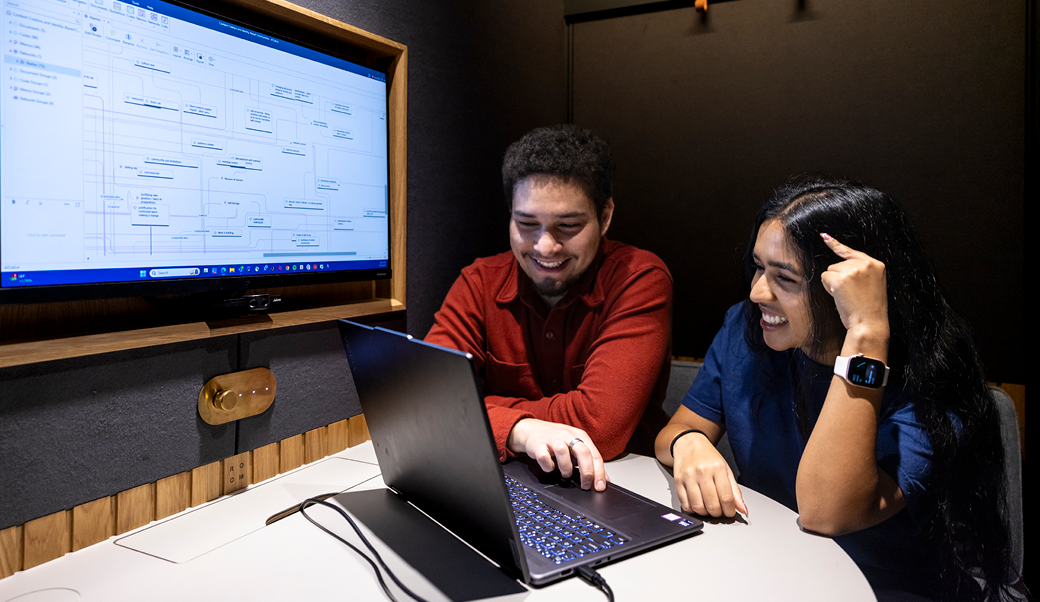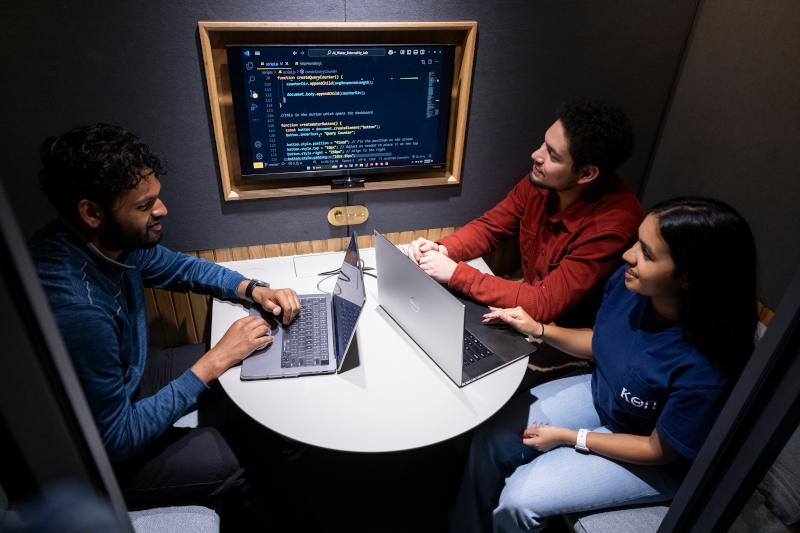AI for STEM Education Center−+
AI4STEM Education Center is a hub for faculty members from the Mary Frances Early College of Education, Franklin College of Arts and Sciences, and College of Engineering, aiming to foster interdisciplinary collaboration on using AI to advance STEM education.
Applied Machine Intelligence Initiative and Education Laboratory−+
The AMIIE Laboratory conducts and promotes fundamental and applied artificial intelligence research and education in solving real-world problems, ranging from health informatics to surveillance systems and security.
Computational Nano/Bio-Mechanics Lab−+
The goal of the Computational Nano/Bio-Mechanics Lab is to understand the fundamental principles that control mechanical properties and behavior of materials in both engineering and biology by virtue of theoretical analyses, computational modeling and experimental investigations.
Developmental Dynamics Lab−+
The Developmental Dynamics Lab focuses on how behaviors and social interactions impact developmental trajectories throughout infancy and into toddlerhood.
Evolutionary Computation & Machine Learning Lab−+
Research in the ECML Lab is centered around genetic and evolutionary algorithms, machine learning and the intersection/ cross-fertilization of the two fields. The lab conducts research in genetic algorithm methodologies and applications in science and engineering with emphasis on using machine learning approaches to enhance evolutionary optimization. It also develops, appl and analyzes machine learning approaches for numerous bioinformatics and computational biology domains.
Forest Management, Planning, GIS, GNSS−+
A research group within the Warnell School of Forestry and Natural Resources, led by Pete Bettinger.
Generative AI Research Cluster−+
The Generative AI Research Cluster is harnessing the power of generative AI to address complex challenges and inspire transformative solutions across domains.
Georgia Gambling and Decision Lab−+
The Georgia Gambling and Decision Lab is based in the Psychology Department of the University of Georgia. The lab’s research is dedicated to the multidisciplinary domains of gambling studies and judgment and decision making under uncertainty.
Georgia Informatics Institutes for Research and Education−+
The explosion of digital information has created new opportunities in so many fields – from the sciences to engineering and the humanities. The goal of GII is to help faculty use informatics as a tool to help answer research questions while making it easier for them to incorporate informatics into their instruction.
Heterogeneous Robotics Research Lab−+
The HeRo lab conducts experimental and application-oriented research in heterogeneous robotics systems of varying functionalities and mobility capabilities. Its vision is to capacitate autonomous heterogeneous multi-human multi-robot systems with intelligent, resilient and robust methods for cooperation, communication and interactions.
Hoarfrost Lab−+
The Hoarfrost Lab features an interdisciplinary team developing cutting-edge tools to explore some of the most mysterious and urgent questions about our ocean, our Earth and beyond. The lab is developing deep learning and other computational approaches to capture the complexity of biological systems.
Hopkinson Lab−+
The Hopkinson Lab studies the ecology and physiology of photosynthetic organisms in marine ecosystems. Its recent research includes developing methods to map marine ecosystems such as salt marshes and coral reefs.
Institute for Cybersecurity and Privacy−+
The mission of the Institute for Cybersecurity and Privacy (ICSP) is to contribute to meeting the nation’s cybersecurity defense research and education needs. The goal of ICSP is to become a state hub for cybersecurity research and education, including multidisciplinary educational programs and research opportunities, outreach activities, and industry partnerships.
Intelligent Vision and Sensing Lab−+
Housed in the School of Electrical and Computer Engineering, the Intelligent Vision and Sensing Lab’s research focus includes robotics, computer vision, AI, deep/machine learning, multimedia and AI-based infrastructure systems.
Linguistic Atlas Project−+
The Linguistic Atlas Project (LAP) consists of a set of survey research projects about the words and pronunciation of everyday American English, the largest project of its kind in the country.
Ma Lab−+
The Ma Lab’s research aims to develop new statistical theory and methods in analyzing vast and complex data to solve scientific and engineering problems with broad societal impacts. Interdisciplinary research led by our lab is making key contributions to resolving grand challenges of big data analytics.
Manufacturing Optimization, Design, and Engineering-Education Lab−+
MODEL is a diverse group of scientists working on design, manufacturing and engineering education research
Physical Activity & Community Environment Lab−+
The PACE Lab is rethinking existing spaces for physical activity.
Quinn Research Group−+
The Quinn Research Group is an interdisciplinary team primarily focused on how data science can be a tool for knowledge discovery in public health applications.
Spatially Explicit Artificial Intelligence Lab−+
SEAI focuses on designing better machine learning and artificial intelligence models by leveraging spatial knowledge and biases.
Sustainable Bioproducts and Biofuels Research Laboratory−+
This research group is focused on developing circular and sustainable technologies for maximum utilization of organic materials into high-value chemicals, fuels, and bioproducts, while modeling and assessing the sustainability of agricultural, food and forestry systems.
THINC Lab−+
Students and faculty affiliated with the THINC lab conduct cutting edge research in AI and Robotics. We rigorously investigate various problems of interest in contexts such as multiagent systems, reinforcement learning, mobile robots, and the semantic web.
Torrance Center for Creativity and Talent Development−+
The Torrance Center for Creativity and Talent Development is a service, instructional and research center based in UGA’s Mary Frances Early College of Education. The overarching goals of the Torrance Center are to investigate, evaluate, and implement techniques for enhancing creativity across domains of human enterprise and to increase creative literacy in the local, state, national, and international communities.
UGA Center for Brain-inspired Artificial Intelligence−+
The University of Georgia Center for Brain-inspired Artificial Intelligence strives to discover fundamental principles in both brain science and artificial intelligence, and to create new biological, physical and computational models that bridge the significant gaps between brain science and AI.
UGA Small Satellite Research Laboratory−+
SSRL is developing and launching new and innovative technologies into space by utilizing the CubeSat platform, a small-scale satellite that is designed for rapid iteration and development.
Virtual Experiences Laboratory−+
VEL serves as the center of virtual reality research and education at UGA. The mission of the VEL is to enable researchers and students to develop and study the next generation of virtual worlds, advanced user interfaces, and virtual reality applications.
Visual and Parallel Computing Lab−+
The goals of the VPCL are to undertake projects that advance the state of the art in the theory and applications of Visual Computing and Parallel Computing.



